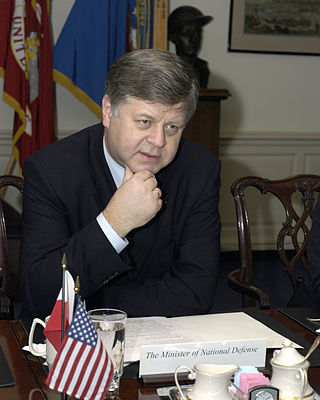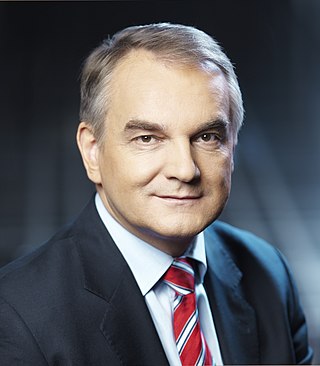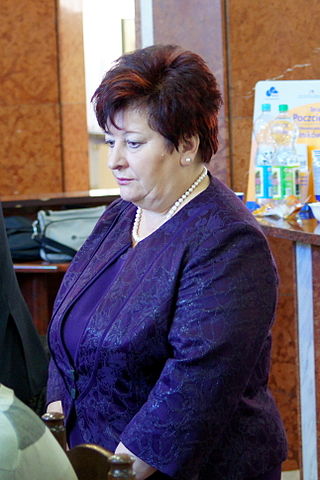
Leszek Cezary Miller is a Polish politician and former prime minister of Poland (2001–2004). He has served as a Member of the European Parliament (MEP) since July 2019.

The Democratic Left Alliance was a social-democratic political party in Poland. It was formed on 9 July 1991 as an electoral alliance of centre-left parties, and became a single party on 15 April 1999. It was the major coalition party in Poland between 1993 and 1997, and between 2001 and 2005, with four Prime ministers coming from the party: Józef Oleksy, Włodzimierz Cimoszewicz, Leszek Miller and Marek Belka. It then faded into opposition, overshadowed by the rise of Civic Platform and Law and Justice.
The Democratic Party, abbreviated to PD, was a minor social-liberal political party in Poland. It had no members of the Sejm, Senate, or European Parliament.

From 1989 through 1991, Poland engaged in a democratic transition which put an end to the Polish People's Republic and led to the foundation of a democratic government, known as the Third Polish Republic, following the First and Second Polish Republic. After ten years of democratic consolidation, Poland joined NATO in 1999 and the European Union on 1 May 2004.

The Social Democracy of Poland is a social-democratic political party in Poland.

Jerzy Andrzej Szmajdziński was a Polish politician who was a Deputy Marshal of Polish Sejm and previously served as Minister of Defence. He was a candidate for President of Poland in the 2010 election.
Democratic Left Alliance-Labour Union was an electoral committee and a coalition of two Polish centre-left political parties: Democratic Left Alliance and Labour Union. At the national level, the alliance arose at the time of the 2001 parliamentary elections and continued through the 2004 elections to the European Parliament. The alliance came together again for the 2009 and 2014 European parliamentary elections.

The Greens is a political party in Poland.

Waldemar Pawlak is a Polish politician. He has twice served as Prime Minister of Poland, briefly in 1992 and again from 1993 to 1995. From November 2007 to November 2012 he served as Deputy Prime Minister and the Minister of Economy. Pawlak remains Poland's youngest prime minister to date.
Poland has a multi-party political system. On the national level, Poland elects the head of state – the president – and a legislature. There are also various local elections, referendums and elections to the European Parliament.

Parliamentary elections were held in Poland on 25 September 2005. All 460 members of the Sejm and 100 senators of the Senate were elected. The election resulted in a sweeping victory for two opposition parties: the right-wing, national-conservative Law and Justice (PiS) and the centre-right, liberal-conservative Civic Platform (PO). The incumbent centre-left government of the Democratic Left Alliance (SLD) was soundly defeated. PiS won 155 seats and PO 133, while the governing SLD was reduced to fourth place with 55 seats, behind Andrzej Lepper's Self-Defence party, which won 56 seats.

Parliamentary elections were held in Poland on 23 September 2001. All 460 members of the Sejm and 100 senators of the Senate were elected. The election concluded with an overwhelming victory for the centre-left Democratic Left Alliance – Labor Union, the electoral coalition between the Democratic Left Alliance (SLD) and the Labour Union (UP), which captured 41% of the vote in the crucial lower house Sejm. The 2001 election is recognized as marking the emergence of both Civic Platform (PO) and Law and Justice (PiS) as players in Polish politics, while also witnessing the outright collapse of the Solidarity Electoral Action (AWS) and its former coalition partner, the Freedom Union (UW).

Grażyna Jolanta Ciemniak is a Polish political figure who has been a member of the Senate of Poland (1993–97) and Deputy President of Bydgoszcz (1998–2001), as well as member of the Sejm of Poland and member of the European Parliament (2004).

Grzegorz Bernard Napieralski is a Polish politician. He is an MP and was chairman of the Democratic Left Alliance (SLD) from 2008 to 2011.

Left and Democrats was a centre-left electoral alliance of political parties in Poland which was created on 3 September 2006, before the Warsaw municipal election of 2006. The coalition's aim was to provide an alternative for both Law and Justice and Civic Platform, which have been Poland's two major political parties since 2005. LiD contested their first national election in October, 2007 and won 53 seats to the Polish parliament, the Sejm. The LiD alliance was dissolved in April 2008, following a rift between the member parties.

National Party of Retirees and Pensioners is a minor left-wing political party in Poland. The main goal of KPEiR is protecting retired seniors, pensioners and trust-busting. The current leader is former Sejm Member Tomasz Mamiński.

Waldemar Włodzimierz Witkowski is a Polish politician who is currently leader of the Labour Union, and was formerly one of the leaders of the Left and Democrats coalition, of which the Labour Union was a part. Since 2006 he is a member of the Greater Poland Regional Assembly.

The Social Alliance was an electoral coalition created for the 1998 Polish local elections. Formed on 27 June 1998, the Social Alliance included the Polish People's Party along with its smaller left-oriented party partners, such as the Labour Union, the National Party of Retirees and Pensioners, the Self-Defence of the Republic of Poland and few members of Alliance of Democrats (Poland). The party represented the "independent left" that challenged the anti-communist and pro-communist dichotomy of Polish politics while maintaining a strongly leftist profile inspired by pre-WW2 socialist and agrarian movements. It protested against the capitalist reforms carried out in Poland such as austerity, criticizing them for creating massive wealth inequality. Nevertheless, the coalition cooperated with the post-communist Democratic Left Alliance as well as the Polish Socialist Party.

Parliamentary elections were held in Poland on 13 October 2019. All 460 members of the Sejm and 100 senators of the Senate were elected. The ruling right-wing Law and Justice (PiS) won re-election to a second term retaining its majority in the Sejm. However, it lost its majority in the Senate to the opposition. With 43.6% of the popular vote, Law and Justice received the highest vote share by any party since Poland returned to democracy in 1989. The turnout was the highest for a parliamentary election since the first free elections after the fall of communism in 1989. For the first time after 1989, the ruling party controlled one house, while the opposition controlled the other.

Jolanta Maria Banach is a Polish politician, teacher, member of the 2nd, 3rd and 4th Sejm terms, 2001-2003 Secretary of State in the Ministry of Labor and Social Policy of Poland, and 2003-2004 Secretary of State in the Ministry of Economy, Labor and Social Policy of Poland.

















